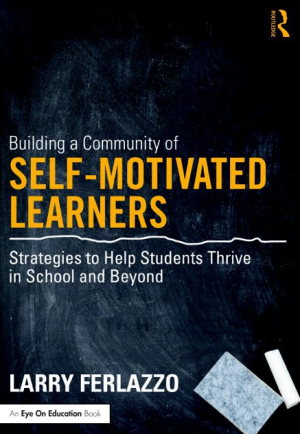
The excerpt below is from the book "Building a Community of Self-Motivated Learners: Strategies to Help Students Thrive in School and Beyond," by Larry Ferlazzo. This excerpt is from the chapter entitled “I Still Want to Know: How Can You Get Students More Interested in Reading and Writing?"
Let’s begin with a review of those essential qualities (needed to develop intrinsic motivation) in the context of reading and writing:
♦ Autonomy. A major Pew Research Center report (Lenhart et al., 2008) found that choice has an equally important role in teens feeling a desire to write (the story in Chapter 1 of my student who was energized by writing about football illustrates this point). Likewise, in reading, extensive research documents that teachers encouraging students to read books of their choice for pleasure is a major contribution towards students developing a positive attitude towards reading and a life-long interest in it (Leisure Reading Task Force, 20014, p. 2).
 ♦ Competence. A scene from the HBO series The Leftovers (http:// www.hbo.com/the-leftovers) succinctly explains why this quality is so important for intrinsic motivation. In it, two FBI agents were sitting in an office, and one told the other that his child wanted to quit soccer and wanted to know if he should let him do it. The other agent asked him, “Is he any good at it?” The first agent responded, “Nobody quits what they’re good at,” and much research backs him up (Tsioulcas, 2013; Yuhas, 2012). Providing scaffolding like writing frames and strategies/tools such as graphic organizers (student- or teacher-created) for responding to prompts (Ferlazzo, 2013, p. 144) can assist students’ developing confidence as writers. The Progress Principle, which highlights that intrinsic motivation can be driven by people seeing meaningful progress in their work, was mentioned in the first chapter and in previous titles in this series (Ferlazzo, 2013, p. 10). Creating structured opportunities for students to see their progress in reading and writing by comparing work (preferably emphasizing tools like “improvement rubrics” that focus more on what they have successfully done and less on their deficits [Ferlazzo, 2011, p. 79]) done at the beginning of the school year with accomplishments later in the year can also support student feelings of competence. In fact, at our school English folders are passed up through the grades and students can see and reflect on their progress over the years!
♦ Competence. A scene from the HBO series The Leftovers (http:// www.hbo.com/the-leftovers) succinctly explains why this quality is so important for intrinsic motivation. In it, two FBI agents were sitting in an office, and one told the other that his child wanted to quit soccer and wanted to know if he should let him do it. The other agent asked him, “Is he any good at it?” The first agent responded, “Nobody quits what they’re good at,” and much research backs him up (Tsioulcas, 2013; Yuhas, 2012). Providing scaffolding like writing frames and strategies/tools such as graphic organizers (student- or teacher-created) for responding to prompts (Ferlazzo, 2013, p. 144) can assist students’ developing confidence as writers. The Progress Principle, which highlights that intrinsic motivation can be driven by people seeing meaningful progress in their work, was mentioned in the first chapter and in previous titles in this series (Ferlazzo, 2013, p. 10). Creating structured opportunities for students to see their progress in reading and writing by comparing work (preferably emphasizing tools like “improvement rubrics” that focus more on what they have successfully done and less on their deficits [Ferlazzo, 2011, p. 79]) done at the beginning of the school year with accomplishments later in the year can also support student feelings of competence. In fact, at our school English folders are passed up through the grades and students can see and reflect on their progress over the years!
♦ Relatedness. The Pew Research Center found that teens say the most important factor for them to feel motivated to write is using it as a way to connect with, and receive feedback from, teachers, family members, and friends (Lenhart et al., 2008). Opportunities for students to discuss what they are reading with their teachers and with their peers in low-or-no-stakes environments has been found to promote a greater interest in reading (Leisure Reading Task Force, 2014, p. 4).


